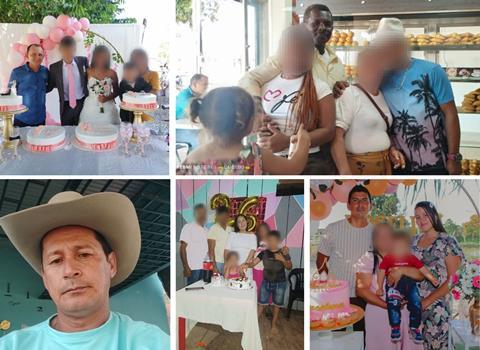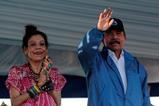In a rural part of Colombia, seven Christians answered a summons from an illegal armed group and never returned home. What happened in Calamar, Ellis Heasley says, is a chilling glimpse into the price some pay in standing for justice and truth in the name of faith

Last week, Colombia’s Attorney General’s Office announced the discovery of eight bodies in a mass grave in a rural part of Calamar Municipality.
James Caicedo, Oscar García, Isaíd Gómez, Maryuri Hernández, Nixon Peñalosa, Maribel Silva and Carlos and Jesús Valero had all been missing for almost three months, after each of them obeyed separate personal summonses issued by an illegal armed group in April.
Seven of these individuals were active leaders and members of their local churches. Carlos and Jesús were brothers; Isaíd and Maribel were married with two children aged 4 and 11; Maryuri had left her five-year-old daughter with her husband while she complied with the summons; James, Oscar and Nixon were all grandfathers.
One conflict into another
The group had settled in Guaviare after being displaced from Arauca to escape violence and severe violations of freedom of religion including the closure of churches and targeting of Protestant pastors by illegal armed and criminal groups that had been operating in the area for at least a decade.
Sadly, as has once again become all too clear, these groups pose a serious threat in far too many parts of Colombia.
The government has accused the Estado Mayor Central (EMC) of being responsible for the forced disappearances and extrajudicial executions of the eight men and women.
The EMC, along with the Estado Mayor de los Bloques y Frentes (EMBF), maintains an active presence in Calamar, where the two forces are in conflict with each other and others seeking to control the region.
As in many other parts of the country where such groups operate, these factions have imposed severe restrictions on freedom of assembly and expression. In practice, this means church leaders are only permitted to hold services at certain times, and must be cautious about preaching on subjects that might upset the groups – like peace or justice or integrity, no doubt.
Persecuted for righteousness sake
All of these groups also aggressively pursue young people and children to replenish their ranks. Any church leader that counsels their youth against getting involved with such groups risks being designated an ‘enemy’ and is likely to be targeted for assassination.
The same is true for leaders who refuse to comply with common demands to use churches to launder money or hide weapons or narcotics, or to allow members of illegal armed groups to hide in their homes.
In the case of the eight men and women whose bodies were discovered in Calamar, it remains somewhat unclear as to why exactly they were summoned and then executed. It is likely a combination of the fact that they had been displaced and come from another conflict-ridden part of the country, plus their roles as active and influential members of their community.
When none of the individuals returned home, family members sought out representatives of the group that had summoned them, which initially outright denied having done so, and later warned them that they should stop looking and ‘consider the case to be closed’.
A call for justice and protection
At first the government was slow to respond to calls, including from the president of the Evangelical Alliance of Colombia and the mayor of Calamar, for an investigation into their whereabouts, however the authorities ultimately confirmed the discovery of the bodies in a statement last week.
Unlike so many others who have seen loved ones disappeared over the course of Colombia’s decades-long internal conflict, the families now have some answers.
They still do not know why their loved ones were targeted, and are probably all too aware that the likelihood that anyone will be held to account for the murders is low.
The loss of these individuals who played such key roles in their churches and in their community will be felt for years to come. This in turn will likely reinforce the climate of fear that has strengthened its hold in the region since their forced disappearances and subsequent executions.
In response to the killings, the president of Colombia, Gustavo Petro, has called on state institutions “to redouble their efforts to protect those who lead through faith, care for others, and peace.”
This is essential; the government must react urgently to the renewed and rising levels of conflict-related violence in the country, including by prioritising the protection of communities in areas where illegal armed and criminal groups are active, and by recognising the specific vulnerability of religious leaders arising from the influence they hold in their communities.
As Christians we must stand in prayer and solidarity with those grieving in Colombia. We must show the families of these victims that their names will not be forgotten, and we must raise awareness about and faithfully pray for an end to a decades-long conflict that is often overlooked in international headlines.






































No comments yet